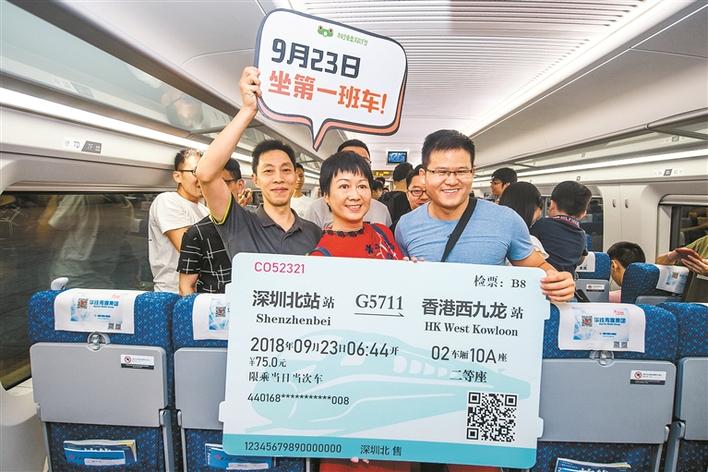Hong Kong seeks new role in reform and opening up

A new high-speed rail link between Hong Kong and the Chinese mainland was launched on Sept. 23 this year, connecting Hong Kong with the mainland’s 25,000 km national high-speed rail network. Some passengers took a group photo on the first train from Shenzhen to Hong Kong. Photo: SZ.GOV.CN
HONG KONG—At a forum on China’s economic practice and policy that took place in late November, more than 300 experts shed light on the past and future of reform and opening up and Hong Kong’s role.
China has embarked on a new path of comprehensively deepening reform and opening up, said Xie Fuzhan, president of the Chinese Academy of Social Sciences (CASS) and secretary of the leading Party members’ group of CASS, who stressed that China’s door will not be closed and will only open even wider.
Under the guidance of the concepts of innovation, coordination, going green, openness and sharing, China will continue to stimulate growth and market vitality, actively create a stable, fair, transparent and predictable business environment, and vigorously build a common development pattern of opening up in the new era, Xie said.
Xie added that China will be committed to reforming the global economic governance system and jointly building the Belt and Road (B&R) under the principles of consultation, contribution and shared benefits, which will inject new drive into the development and prosperity of all countries in the world.
Paul Chan, the financial secretary of the Government of the Hong Kong Special Administrative Region, said that Hong Kong has played an active role in the process of economic reform and opening up in the Chinese mainland and has also benefited greatly from the opening up and growth of the mainland’s economy.
In the future, Chan said, Hong Kong should more proactively take advantage of the development opportunities provided by the B&R and the Guangdong-Hong Kong-Macao Greater Bay Area, construct more science centers and strengthen its function as an international financial center, further bridging economic, trade and financial ties along with exchange of talent and technologies between the Chinese mainland and the rest of the world.
Victor Fung, chairman of the Fung Group, said that Hong Kong has closely participated in the reform, opening up and economic growth of the Chinese mainland in the past four decades, helping international capital enter the mainland and pushing Chinese products out to the world. At present, Hong Kong needs to find a new role amid the dramatic changes in the global economic and trade pattern.
Long Guoqiang, deputy director of the Development Research Center of the State Council, suggested Hong Kong adjust its development strategy with the times, actively integrate into the B&R and participate in the construction of the Greater Bay Area, which will greatly benefit Hong Kong.
Pei Changhong, former director of the Institute of Economics at CASS, analyzed the new trends in China’s high-quality development and the new advantages of foreign trade growth. Currently, new industrial forms are booming—the digital economy, high-end manufacturing and intelligent manufacturing, along with special industries formed by the introduction of certain public goods into the market.
In the future, according to Pei, China’s economic strength will gather in the Guangdong-Hong Kong-Macao Greater Bay Area; Shanghai and the Hangzhou Bay Area; and the Beijing, Tianjin and Bohai Bay Area. The population, land area and port container throughput of the Guangdong-Hong Kong-Macao Greater Bay Area all rank first among such aspects of the world’s four major Bay Areas, and its total GDP is second only to that of the New York Bay Area. The Greater Bay Area has a promising future.
As its economy shifts from high-speed to high-quality growth, China needs to deepen the reform of the financial system in the direction of a law-based model, digitization, inclusiveness and internationalization, said He Dexu, director of the National Academy of Economic Strategy at CASS. The reform centers on enhancing the capacity of the financial services to support the real economy, which requires building a modern financial system.
Lawrence Lau, former vice chancellor of the Chinese University of Hong Kong, said that Hong Kong played an indispensable role in the early days of the reform and opening up of the Chinese mainland. It was the most important source of direct investment and played a key role in entrepot trade.
In the future, Lau suggested, as an international financial center, Hong Kong should seize the opportunity to actively integrate into the overall development of the Greater Bay Area and become a platform for venture capital, an innovation base and a financing center of the world.
(edited by JIANG HONG)

 PRINT
PRINT CLOSE
CLOSE